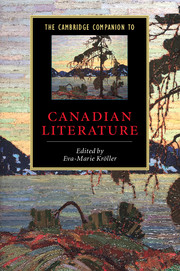Book contents
- Frontmatter
- Introduction
- 1 Aboriginal writing
- 2 Francophone writing
- 3 Exploration and travel
- 4 Nature-writing
- 5 Drama
- 6 Poetry
- 7 Fiction
- 8 Short fiction
- 9 Writing by women
- 10 Life writing
- 11 Regionalism and urbanism
- 12 Canadian literary criticism and the idea of a national literature
- Further reading
- Index
- Series List
Introduction
Published online by Cambridge University Press: 28 May 2006
- Frontmatter
- Introduction
- 1 Aboriginal writing
- 2 Francophone writing
- 3 Exploration and travel
- 4 Nature-writing
- 5 Drama
- 6 Poetry
- 7 Fiction
- 8 Short fiction
- 9 Writing by women
- 10 Life writing
- 11 Regionalism and urbanism
- 12 Canadian literary criticism and the idea of a national literature
- Further reading
- Index
- Series List
Summary
Life of Pi: Reception of a Canadian novel
The nominees for the 2002 Booker Prize included three Canadian books: Carol Shields's Unless, Rohinton Mistry's Family Matters, and Yann Martel's Life of Pi. The news was welcomed in Canada with great satisfaction, but because none of the authors was born in the country, media at home and abroad launched an intense investigation of how to determine the “Canadianness” of a writer. Depending on the nationality of the commentator, these reflections ranged from the congratulatory and envious to the suspicious and defiant. The South China Morning Post described Mistry as “born in Mumbai but liv[ing] in Canada” and Martel as a “Spanish-born writer living in Canada,” although it did identify the American-born Shields as Canadian. Responding in the Toronto Globe and Mail, Charles Foran insisted that national labels must yield to creative identities because “their presence is the country” and “Choose Canada, and you are Canadian.” American and British papers alike ascribed these and other writers' remarkable success to the Canadian government's active deployment of literature as part of its Foreign Affairs portfolio and they praised its protectionist attitude towards the publishing industry.
- Type
- Chapter
- Information
- The Cambridge Companion to Canadian Literature , pp. 1 - 21Publisher: Cambridge University PressPrint publication year: 2004
- 1
- Cited by



